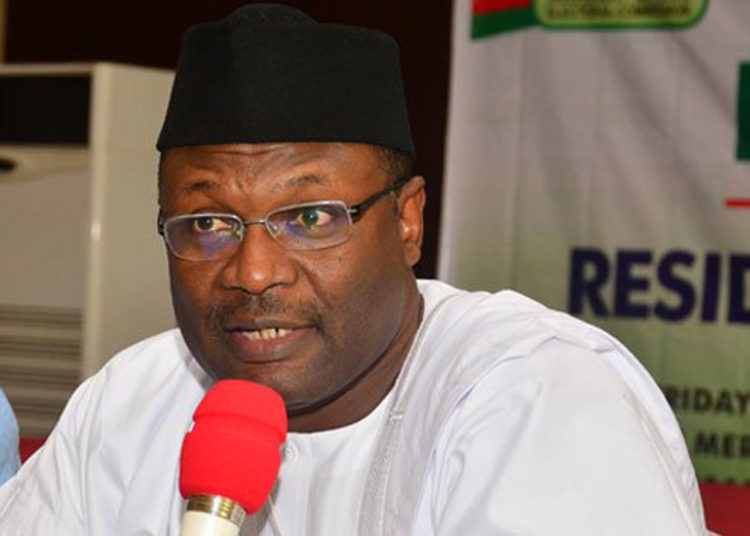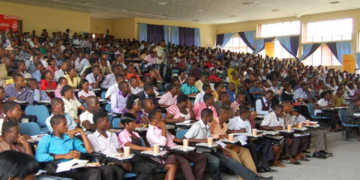Apparently acting on a report by LEADERSHIP on reckless spending by political parties and their candidates, the Independent National Electoral Commission (INEC) has said the election expenses of a candidate must not exceed the limits prescribed in the Electoral Act 2022.
According to the Act, the maximum amount that can be incurred by a candidate for governorship election should not exceed N1 billion, while senatorial and House of Representatives candidates should not exceed N100 million and N70 million in election expenses respectively.
The Electoral Act defines election spending as “expenses incurred by a political party within the period from the date notice is given by the commission to conduct an election up to and including the polling day in respect of the particular election”.
Basically, Section 88 (2) of the act stipulates that the maximum election expenses to be incurred by a candidate at a presidential election should not exceed N5 billion.
“In the case of State Assembly election, the maximum amount of election expenses to be incurred by a candidate shall not exceed N30,000,000. In the case of a chairmanship election to an Area Council, the maximum amount of election expenses to be incurred by a candidate shall not exceed N30,000,000. In the case of Councillorship election to an Area Council, the maximum amount of election expenses to be incurred by a candidate shall not exceed N5,000,000,” the act reads.
“A candidate, who knowingly acts in contravention of this section, commits an offence and is liable on conviction to a fine of 1% of the amount permitted as the limit of campaign expenditure under this Act or imprisonment for a term not more than 12 months or both.”
INEC national commissioner and chairman, Information and Voter Education Committee, disclosed this yesterday in a statement released in Abuja along with the guidelines.
He said election expenses of off-cycle or other elections shall relate to the period between publication of notice for particular election by the Commission and date of election.
The commission explained that election expenses of political party mean all expenses in cash or otherwise incurred by a political party or candidates as well as party primary expenses of aspirants from the date notice of election is published to the day of elections only.
It said they exclude expenses incurred before the publication of notice of election.
The guidelines reads in part: “The election expenses of a Political Party shall be in three parts: i. For the management of Aspirants and Party Primaries. ii. For management of Candidates and conduct of elections. iii. For miscellaneous election expenses.
“The election expenses of a Political Party for management of Party Primaries shall not exceed two-third (2/3) of the limits prescribed for candidates expenses in the Electoral Act, 2022 for respective elective positions.
“The election expenses of a Political Party for conduct of elections shall not exceed two-third the limit of election expenses of each Candidate multiplied by the number of Candidates the Political Party shall sponsor in a particular election for elective positions.
“The miscellaneous election expenses of a Political Party shall include but not limited to: i. Pre-election cases against the party. ii. Post-election or election petitions. iii. Re-mobilization of Party members after elections.”
The commission also said every political party shall submit to the commission, detailed annual statement of their “assets and liabilities and analysis of its sources of funds and other assets, together with a statement of its expenditure between 1st January and 30th March of the succeeding year in hard and soft copy.”
On disclosure and forfeiture of funds received from outside Nigeria, INEC said every political party shall notify the Commission of and transfer to the Commission any funds or other assets remitted or sent to it from outside Nigeria within 21 days of receipt.
2023: INEC Promises To Address Concerns, Objections On Voter Register
Where needed, it said the political party shall provide such information as may be required by the commission.
On submission of party election expenses report, the commission said every political party that participated in an election shall submit to the portal designated by the commission an audited report of its election expenses within six months after an election.
“The reporting period shall commence 360 days to, and including, the Election day. The report shall be signed by the Auditors of the Political Party and counter signed by the national chairman of the Political Party supported by a sworn affidavit by the signatories as to the correctness of the content of the report.
“The report shall show the amount of money expended by or on behalf of the Political Party on election expenses, the items of the expenditure, and commercial value of goods and services received for the purposes of election”, it noted.
INEC said every political party shall publish the election expenses report it submitted to the Commission in at least two national newspapers and on its website.”
The commission also noted that every political party sponsoring the election of a candidate shall submit a report of the contributions made to it by individuals and entities within three months after the announcement of the results of an election.
“The report shall indicate the names, addresses, occupation of donor(s) and the amount of money donated.”
The Commission also warned individuals, political parties, or candidates not to contribute or accept more than N50 million in donations.
As contained in the guidelines, INEC said, “The maximum amount of money or other assets that an individual, a group of individuals or an entity can donate to a political party or aspirant for an election shall be N50 million.
“A political party shall not accept any monetary or other contribution which is more than N50,000,000 except it identifies and discloses the source of the contribution to the Commission.
“Contribution to candidates by an individual or entity shall be from 150 days allowed for campaigns to election day. Contribution to aspirants by an individual or entity shall be from the date notice of the election is published to the conclusion of party primaries.”
It explained that election expenses of a political party means all expenses in cash or otherwise incurred by a political party or candidates as well as party primary expenses of aspirants from the date notice of election is published to the day of election only.
INEC also instructed that every party should ensure their candidates maintain a detailed record of all contributions as well as any other source(s) of funds, and the record shall include names, addresses, and occupation of the donor(s) and amount donated.
It said the audited returns of campaign expenses submitted by a political party shall indicate details of donations, other sources of funding, expenditure on goods, services, and sundry expenses incurred for the purpose of an election.
They are to be submitted to the Commission in a separate audited return within six months after an election; signed by auditors of the party and countersigned by the chairman of, and supported by a sworn affidavit by the signatories as to the correctness of its contents.
On the conduct not permissible during political rallies, INEC insisted: “No person attending a political rally or procession shall be in possession of any offensive weapon, except a police officer or a member of a security agency authorised to carry arms and is specifically posted to be present at that political rally or procession.
“No political rally or procession shall hold in places designated as religious centres, police stations and public institutions. Political rallies or processions shall not involve the use of abusive language or any form of hate speech. Political rallies or processions shall not involve the use of physical force or coercion by organised groups or individuals.”
INEC said campaigns by political parties and their candidates shall be based on their constitution and manifestoes, and shall comply with the provisions of; regulations and guidelines for political parties 2022 issued by the Commission; code of conduct, regulations and guidelines that may be issued by the National Broadcasting Commission; and COVID-19 safety protocols and other public health regulations and measures.
INEC stated: “The target audience of political campaign shall be registered voters. The programmes, policies and projects of political parties are offered to voters and achievements of programmes where applicable as contained in the political party’s Constitution and Manifesto.”
Meanwhile, INEC yesterday approved the reappointment of the secretary of the Commission, Rose Oriaran-Anthony, for a second and final term of four years, with effect from December 7, 2022 in accordance with Section 8 of the Electoral Act, 2022.
We’ve got the edge. Get real-time reports, breaking scoops, and exclusive angles delivered straight to your phone. Don’t settle for stale news. Join LEADERSHIP NEWS on WhatsApp for 24/7 updates →
Join Our WhatsApp Channel











